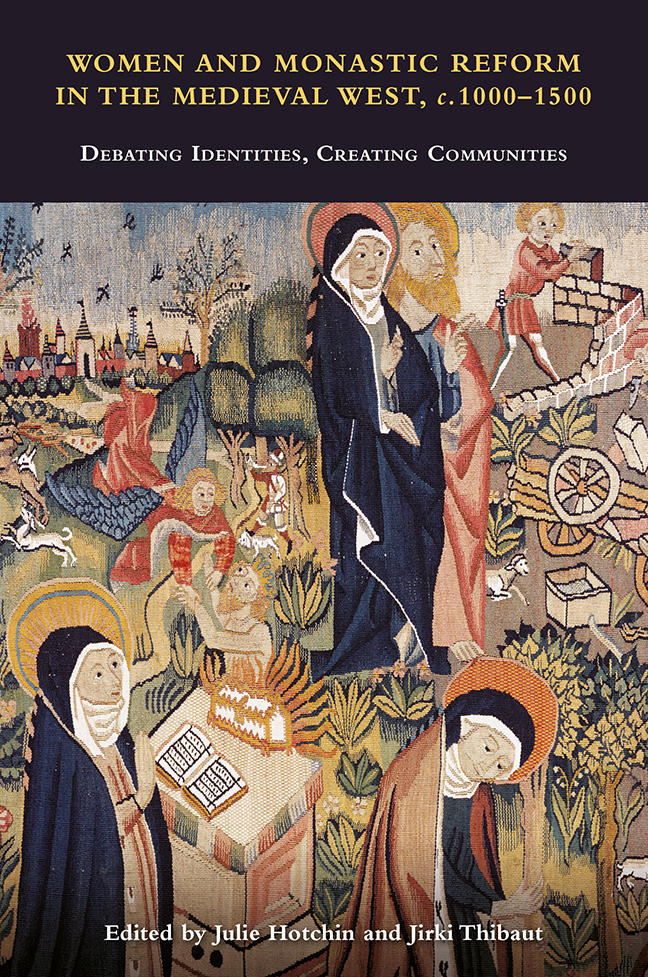 Women and Monastic Reform in the Medieval West, c.100-1500
Women and Monastic Reform in the Medieval West, c.100-1500 Book contents
- Frontmatter
- Dedication
- Contents
- List of Illustrations
- List of Contributors
- Acknowledgements
- List of Abbreviations
- 1 Debating Identities: Women and Monastic Reform in the Medieval West, c. 1000–1500
- 2 Liturgy and Female Monastic Hagiography Around the Year 1000: A lecture croisée of the Life of Liutrud, the Second Life of Glodesind of Metz and the So-called Pontificale Romano-Germanicum
- 3 Remakers of Reform: The Women Religious of Leominster and their Prayerbook
- 4 The Materiality of Female Religious Reform in Twelfth-Century Ireland: The Case of Co-located Religious Houses
- 5 Women as Witnesses: Picturing Gender and Spiritual Identity in a Twelfth-Century Embroidered Fragment from Northern Germany
- 6 Mulieres religiose and Cistercian Nuns in Northern Italy in the Thirteenth Century: A Choice of ‘Order’
- 7 Circulation of Books and Reform Ideas between Female Monasteries in Medieval Castile: From Twelfth-Century Cistercians to the Observant Reform
- 8 Women, Men and Local Monasticism in Late Medieval Bologna
- 9 Building Community: Material Concerns in the Fifteenth-Century Monastic Reform
- 10 Who Made Reform Visible? Male and Female Agency in Changing Visual Culture
- 11 Nuns, Cistercian Chant and Observant Reform in the Southern Low Countries
- Index
- Other volumes in Studies in the History of Medieval Religion
11 - Nuns, Cistercian Chant and Observant Reform in the Southern Low Countries
Published online by Cambridge University Press: 09 January 2024
- Frontmatter
- Dedication
- Contents
- List of Illustrations
- List of Contributors
- Acknowledgements
- List of Abbreviations
- 1 Debating Identities: Women and Monastic Reform in the Medieval West, c. 1000–1500
- 2 Liturgy and Female Monastic Hagiography Around the Year 1000: A lecture croisée of the Life of Liutrud, the Second Life of Glodesind of Metz and the So-called Pontificale Romano-Germanicum
- 3 Remakers of Reform: The Women Religious of Leominster and their Prayerbook
- 4 The Materiality of Female Religious Reform in Twelfth-Century Ireland: The Case of Co-located Religious Houses
- 5 Women as Witnesses: Picturing Gender and Spiritual Identity in a Twelfth-Century Embroidered Fragment from Northern Germany
- 6 Mulieres religiose and Cistercian Nuns in Northern Italy in the Thirteenth Century: A Choice of ‘Order’
- 7 Circulation of Books and Reform Ideas between Female Monasteries in Medieval Castile: From Twelfth-Century Cistercians to the Observant Reform
- 8 Women, Men and Local Monasticism in Late Medieval Bologna
- 9 Building Community: Material Concerns in the Fifteenth-Century Monastic Reform
- 10 Who Made Reform Visible? Male and Female Agency in Changing Visual Culture
- 11 Nuns, Cistercian Chant and Observant Reform in the Southern Low Countries
- Index
- Other volumes in Studies in the History of Medieval Religion
Summary
Over the course of the long fifteenth century, myriad efforts rallied to return religious life to its perceived early customs and authoritative sources. Kaspar Elm once described these initiatives, known collectively as the Observant movement, as an ‘almost incomprehensible variety of local reform’. Controversial practices such as simony and private property bitterly divided communities and prompted calls for change. Intensifying matters further, the common observance and vitality of female abbeys in this period was disproportionately compromised as a result of economic insecurity. Secular and religious leaders alike took notice, and women's religious discipline became the object of heightened scrutiny and external intervention, with or without the approval of the sisters. These leaders imagined temporal scarcity and structural decrepitude to be a product of spiritual laxity, not vice versa. Consequently, histories of late medieval religion have long painted a picture of almost universal religious corruption and decadence in this period, for which the Observance offered a corrective. But in the last several decades scholarship has uncovered a much more complex picture, one that has begun to rehabilitate the intellectual engagement of women.
Reform of women's communities in the fifteenth century was typically initiated and supervised by men but carried out through lengthy visitations and exchanges among nuns themselves. While examples abound of nuns’ resistance to external coercion, contributing to their image as recalcitrant and disorderly, Anne Winston-Allen has argued that nuns generally welcomed opportunities for education and stricter discipline, provided they were grounded in their own rule. These opportunities for teaching and learning were most often administered by women for women through a process that was overwhelmingly oral. Therefore, what this education entailed in individual communities, the extent to which male supervisors were involved, and how men responded to those interactions are questions that histories predominantly reliant on documentary accounts have been ill suited to address. Historians investigating such questions can benefit from other sources attesting to these engagements.
This chapter examines how musical revisions made to the chant books by the nuns of the Cistercian abbey of Beaupré in Grimminge, East Flanders (Baltimore, Walters Art Museum, W. 759–62) reflect a changed understanding of both local tradition and twelfth-century authority, namely that of St Bernard of Clairvaux and the standardised version of Cistercian chant created under his supervision.
- Type
- Chapter
- Information
- Women and Monastic Reform in the Medieval West, c.100-1500Debating Identities, Creating Communities, pp. 249 - 270Publisher: Boydell & BrewerPrint publication year: 2023


